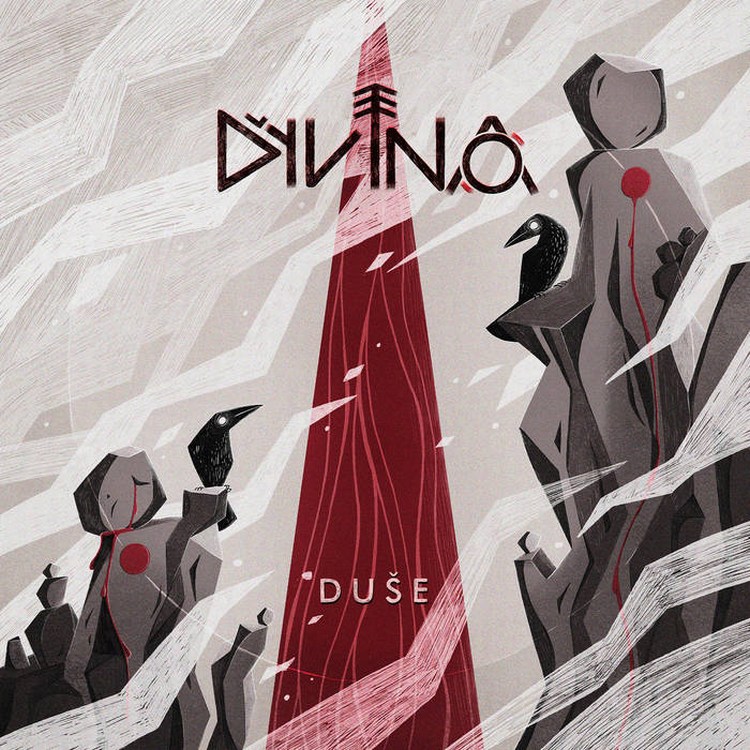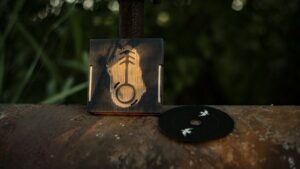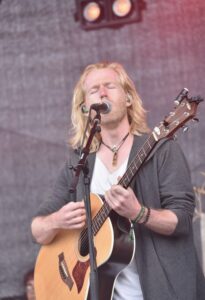Saturday the 5th of August, 11:30, Meadow stage. I was watching a Czech neo-folk band getting ready for their gig. One of the many new names on Castlefest this year. Their EP Počva (2019) had made quite an impression on me beforehand, but nothing – and I do mean nothing- could have prepared me or the other members of the crowd for what we were about to see: A performance with the impact, the energy, and the spirituality of the awesome Sowulo concert just a year before, or the mind-blowing live stream concert Irdorath recorded in 2020.
But there was one small difference. Instead of performing in front of a full Village Stage field; instead of blowing away a full live-stream crowd, this band was playing at 11:30 for 100+ people at the most.
It was then and there, halfway through the gig, as lead vocalist Vitus Pribylus was pouring out every ounce of his soul toward the sky, that I decided the world had to know about this band. I had to tell people about this. I just had to. And so my retirement turned into a sabbatical. A sabbatical I’m breaking right here, right now! And Ďyvina is the reason why! What a band! Castlefest please put them on a bigger stage and a better timeslot next year. They so deserve it!
Before I even start talking about the music on Duše I have to mention the CD booklet. The wooden (!) front is fully hand-crafted by Ďyvina mastermind Vitus Prybilus. It is a beautiful piece of art in its own right. In the ‘old ‘days’ – showing my age here- there was always a moment of beauty, of calmness, of preparation when carefully removing an elpee from its sleeve. You did it with care. It slowed you down, emptied your mind, and in a way prepared you for the music you were about to hear. Removing the leather binding tying the Booklet together does exactly the same thing. Putting a CD in a CD player suddenly becomes a magical moment again.
I asked Vitus who designed the booklet:
-‘Richard Hladký designed the wooden front cover and generously provided me with his self-made CNC machine. Every single cover is handmade, sanded, stained and oiled. Noemi Valentiny, who you saw doing backing vocals and hand drum during Castlefest, designed all the graphics found in the booklet – whether it’s the CD print, front cover, and she also edited all the texts and lyrics.’
I have to admit that I was left a bit confused about the status of Ďyvina after reading your background info. When I watched you at Castlefest I was convinced Ďyvina was a band. But reading into the band I’m starting to wonder if Ďyvina is your personal project?
-‘Both actually. The origin of Ďyvina was more of a personal project, but from the beginning, I was always leaning a bit half-half towards a real band. Our guitarist Anděl actually co-founded Ďyvina with me. I’ve always had the intention to play the music live, so I have always been open to work with other musicians. The line-up you saw on Castlefest is quite new. We first played in this line-up a year ago.
Primarily all of the live members are my friends. We all knew each other even before I asked them to join Ďyvina. I got to know our guitarist Anděl through my former work as a sound engineer in a theater where he performed. Our singer Noemi I know since high school, we studied at university together and also played together in our former band Pilgrim. Our drummer Siwa and flutist/bowist Joan – she is Siwas daughter- I met at our first Ďyvina gig, where they wanted to discuss hurdy-gurdy. Siwa plays hurdy-gurdy just as me. (We actually have three gurdist in Ďyvina, besides Siwa and me, Noemi played hurdy-gurdy in our former band).’
Are those the same people that helped you record Duše?
-‘Mostly not no. Jakub Gabriel Anděl Rajnoch added a few guitar parts, particularly fingerpicking, at which he is a beast!
Lenka Jeducha Ondráčková played a few of the drum sections and the gudok (an ancient Eastern Slavic string instrument somewhat similar to a lyre, played with a bow). Martina Morgyš Lamschová added precise whistle parts. Zora Matulová played the harp sections, Johana Joan Rybenská nyckelharpa, and Barbora Števanka Kadlíčková the violin.
Noemi Valentíny (left) who I named before provided the second voice of the hurdy-gurdy in Nevolja and played the piano. She also composed the beautiful piano outro you find at the end of Duše.
Ján Garláthy arranged the brass section of three talented individuals: Lukáš Brázdil (French horn), Marek Bukovjan (trombone), and Martin Cupal (bass trombone).
Most of the people mentioned above also lent their voices to Duše. The complete list of vocal contributors includes: Jeducha, Jakub Rajnoch, Morgyš, Liliana Heczková, and Noemi, along with a few other hosts – my dear friends from the band Ragojka: Kateřina Stavinohová, Eva Paličková, and Jakub Vaněk. Also Jeducha’s children: Vít & Tonda Sydor, and my own dear grandma Hildegarda Panašová.’
Could you tell me a bit about the lyrics of the songs? Looking at the intensity of the Castlefest performance, the historical instruments you use, and the stage props, I would say you are a pagan band. Do you agree?
-‘I’m very enthusiastic about the traditions and folklore of Ancient Europe, but I don’t really consider myself to be a pagan. Sometimes that is my personal struggle with Ďyvina’s music as it is labeled pagan folk due to its sound and the instruments used while it is not. Rather than trying to celebrate the beliefs of our predecessors, I use it in my lyrics just as a metaphor for the actual themes I’m dealing with in my life. That’s why I call our music neo-folk, or maybe post-paganism. That’s an idea that arose in my mind the other day — the idea of post-paganism. What do I mean by that?
It comes from my ponders about my beliefs and whether Ďyvina is really playing pagan folk. As I said, I do not consider myself a pagan, nor atheist, nor any other ‘labeled’ believer. I like the old traditions, the old way of thinking and I like folklore, but have I ever genuinely believed in gods? To me, gods are simply names for different natural energies. I don’t perceive gods as supernatural beings. This is where my path somehow diverges from nowadays neopaganism. But this strong connection to nature and some kind of primal energy persists in my mind. This is where the term ‘post-pagan’ emerged. A person highly connected with nature and our ancestors, while acknowledging the reality of living in a modern urban society with a contemporary mindset and present-day demons. This is what I truly relate to, and it’s also what in a way Ďyvina’s music represents.
As for explaining the song lyrics. That’s a bit of a hard question for an introvert like me, but actually, if you take a look at our YouTube channel, there are acoustic versions of our songs performed just by me – every video starts with an introduction where I try to talk about the particular song and all the songs have English subtitles. You can find the link here.
Be it Post-Paganism or Neo-Folk, this album just oozes quality, from beginning to end. I’m not gonna review every single song but pick out a few of my personal highlights. The first of them being the epic power ballad Jezděc. That intro alone is beautiful. Full of cool sample effects, and dramatic drums before the hurdy gurdy slides in. Like the whole album it is a beautiful mix of acoustic Slavic- and Nordic folk. As if the Belarusian ethno folk band Troitsa met up with Skáld for a recording session. Listen to those beautiful Slavic melody lines,and those impressive Nordic folk drums. Deep, low and powerful. Just as deep and powerful as Vitus voice. I come to that later. For now I want to focus on the power of it all, on the choir pulling me in a dark Scandinavian night. A wolf tribe surrounding me as we chant away with them. The haunted flute pulling it all together. The emotional tension in the vocals. The build up to its climax. An epic song from beginning to end.
Vlčí Mák carries on with that same epic strength. An acoustic guitar; a sample of water; a soft drone in the background; whispered vocals, flowing into a Native American feel with the low whistle and driving drums. Such a cool mix. Again reminiscent of the band Troitsa. This time mixed with the whispered vocals of Vladimir Irdorath and Ivy Leaves on flute added for good measure. The song itself is a powerful love ballad expressing loss and pain in a way that is breathtaking. Truly breathtaking. Especially when the song builds up momentum and Vitus lets his emotions go in a full on scream. The full baritone melody line Vitus produces right after it tears me up every time I hear it. Pure beauty.
I just need to showcase Vitus’ voice at this point. And no better song then Vrane Krila to do it. This song, that started life as a piano ballad, features Vitus’ voice in every aspect of it’s capability. I already mentioned the impressive whispered spoken word parts. His singing voice can only be described as pure awesomeness. He has that rich deep immense sound that only Slavic people seem to use. Sure there are more men singing contemporary music with a baritone voice. But so rich. With such depth, warmth and emotion. That is rare in these western parts. When Vitus opens up his lungs in full voice it sounds like he has hidden a whole neolithic cave in it. The sound comes from somewhere deep down in the earth and seems to reach to the eagles flying over the highest mountains’ trees. That’s how big his voice is. You need some impressive core strength to pull a voice like this off and he has it through his whole range. From his lowest notes, through his belt into his equally strong head voice. And he is not doing it once. No, he is blessing us with this awesome sound, song after song after song. Amazing!
Combine that voice with the deep sounds of the drums; the raw sound of the low whistle; the beautiful addition of a choir and you get something truly impressive. But he also knows how to pull back. The piano outro written by Noemi is the perfect counterbalance for the epic sound we heard just before. That goes for every song on Duše. They are beautifully written songs that build up and slow down with a wonderful flow. From majestic to really small. From tender to out of this world large. A compliment has to go to Vitus his sound engineer skills, and Max Morton’s mastering of the music. Together they made this album sound awesome. It equals the majestic sound Fieke van den Hurk can produce, and the outcome can only be jaw dropping. Song after song after song.
I tried to keep this review short, but the music got hold of me I’m afraid. Listen to V Maskah. That cool percussion intro. Vitus and Max are nicely playing with some nature samples and stereo effects there. While also playing with some more drone like soundscape effects that remind me a lot of the Finnish folk band Gói, who have that same ability to seamlessly combine ancient instruments with modern sounds and samples. The shamanic drums that follow have to be played as loud as possible. There is no other way. Much to the dismay of my cat and the neighbours downstairs I must add. The chant in this song is ridiculously catchy. The children and Vitus’ grandmother joining in on the spoken word part is a stroke of musical genius as is the Native American chanting at the end. As if Taloch Jameson (The Dolmen) himself joins in for a moment of free expression. Wow! Just wow.
Počva has something Irfanesque about it and has become another firm favourite of mine. The song is so strong, so powerful, so enticing, yet the cool thing is that within that immensely powerful sound; Within those bigger-than-life emotions pouring out of Vitus; the melody lines are actually quite catchy and upbeat. I found myself singing along rather quickly with many of the songs. Only to be held back by my lack of knowledge when it comes to the Slavic language.
Ďyvina in an older live band setting at Veligrad in 2021
All in all Duše is a brilliant debut. From the way it looks, to the way it sounds. Brilliant neo-folk songs. A beautiful mix between the rich beauty of Slavic folk and the dark shamanic sound of Nordic folk. An album that gets better and better the more times you listen to it. It does something with you every time you play it.
I didn’t mention it yet, but within all that emotion pouring out, it is actually a cheerful album. It invites you to dance and celebrate. I would highly advice you to do just that. With this album, or seeing them live. Because there is just one thing better than Ďyvina on CD: seeing them live on stage!
Cliff
- Editor: Sara Weeda
- Pictures by Ďyvina
- Album artwork by Noemi Valentiny
- Wooden front cover design by Richard Hladký
Ďyvina can be found here:
- Facebook: @dyvina.official
- Instagram: @dyvina_band
- Youtube: https://www.youtube.com/Ďyvina
- Spotify: Ďyvina
- Bandcamp: https://dyvina.bandcamp.com/music




